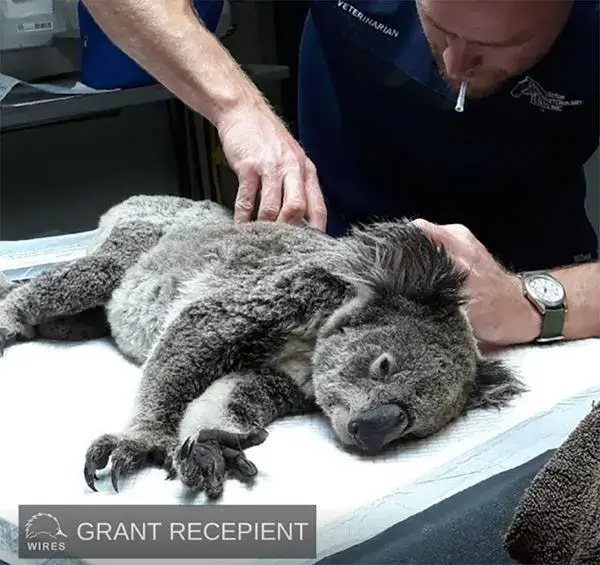2025 Mikla Lewis Grant - Gondwana Rainforest Trust
February 2026
For emergency rescue support 24/7 please call 1300 094 737

The first week of January 2020 was one of the worst in our history, as the ongoing tragic toll of the fires that had raged for months become clear, with millions of hectares of wildlife habitat and many animals lost.
Deeply moved by the destruction, the global community donated generously to support immediate rescue and care requirements and the long-term recovery work required to help surviving species.
Thanks to their generosity, on January 10th WIRES was able to confirm that we could provide national support for wildlife. By January 22nd WIRES had confirmed 3 million in funding for immediate rescue and care requirements, 1 million to support WIRES 28 branches and 3000 volunteers within NSW the worst impacted state and 2 million for national rescue organisations, licensed carers and vets. This was later increased to over 4 million.
At the same time WIRES began working on a wide range of partnerships and programs focused on long-term recovery.
WIRES Wildlife Relief Grants Program for national rescue organisations and licensed carers opened in January. The relief grants were targeted to provide critical emergency support to volunteers assisting wildlife impacted by the fires and drought, as well as the veterinary sector, both of whom were working tirelessly to manage native animals currently requiring immediate and ongoing care.
In all over 240 projects were supported, with 223 grants approved for national wildlife rescue groups and licensed carers, representing more than 6000 wildlife carers across Australia.
Licensed rescue groups and carers licensed as individuals were able to apply for funds to cover costs of:
• Food for animals in care due to the fires, drought and extreme weather
• Medical supplies and medication for native animals in care due to the emergency events
• Veterinary costs associated with ongoing health checks during the rehabilitation of impacted animals
• Rescue and care equipment required to immediately assist affected animals
• Replacement of rehabilitation enclosures destroyed by the fires and building of new enclosures to
accommodate the influx of animals due to fire and drought.
Projects were able to be supported across all States and Territories and the breakup of the 223 rescue and care projects supported (excluding WIRES Branches) was:
• VIC 101 projects
• QLD 45 projects
• WA 35 projects
• SA 18 projects
• NSW 17 projects
• TAS 4 projects
• NT 2 project
• ACT 1 projects
 |
 |
WIRES have been delighted to be able to connect with hundreds of groups across Australia and provide them much needed support for wildlife at this critical time. We are also working on a range of ongoing initiatives to increase collaboration within the sector to improve rescue and care capacity nationally.
We have received some amazing feedback from grant recipients and share a few of those with you below.
WIRES Wildlife Emergency Grant Recipient - LAOKO, a wildlife rescue group in the Snowy Mountains.
Imogen was orphaned after her mother had to sadly be euthanised due to serious bushfire and drought-related health problems. She is now living at a pre-release site where she can gain strength, forage for her own food, and learn to climb real trees alongside other koalas.
"We are very grateful to WIRES for supporting us to achieve such positive outcomes for bushfire and drought-affected wildlife in our region. Snowy Mountains region has a small koala population with a limited distribution, making this kind of work vital in their conservation.
Imogen will remain in this pre-release enclosure, being cared for by LAOKO koala carers Alison and Richard, until she reaches the required weight and is vet checked before eventual release into natural habitat."

WIRES Wildlife Emergency Grant Recipient
Wombat Awareness Organisation - South Australia
"The drought has had such a significant effect on the entire population of Southern Hairy-nosed Wombats and we have been devastated with the concept that we cannot save as many of these precious animals as possible due to the sheer cost of feed, veterinary treatment and medications. We are so grateful to WIRES for this life-saving support to WAO to assist the wombats of SA in need." Wombat Awareness Organisation , Brigitte Stevens
‘Apricot’ pictured, was a victim of starvation as a result of the drought. She has blossomed into a beautiful, quirky little girl.

WIRES Veterinary Grant Recipient - Grafton Veterinary Clinic
Grafton Veterinary Clinic treated many of the wildlife victims during the fires in Iluka and provides ongoing care and support for WIRES carers in the Clarence Valley. Thanks to our generous donors and via our Veterinary Grants we have been able to give back to them by assisting in the purchase of a portable ultrasound machine. The ultrasound will allow vets to treat and diagnose health issues in Koalas by checking their bladders, kidneys, prostate in males and activity in their gut as well as identifying some symptoms of chlamydia.
WIRES Wildlife Emergency Grant Recipient - Hepburn Wildlife Shelter VIC
"The equipment we can buy from this grant will mean that we can save more lives. We will be able to provide proper resources and safety equipment to our tireless wildlife rescuers, and fulfil our dream of building a large rehabilitation flight aviary for the beautiful Grey-headed flying-foxes that need our help in the hot summers. It means that the shelter will be in a position to provide triage resources if our local wildlife ever faces a bush fire event. We are very grateful to WIRES for this much needed assistance." Gayle Chappell- Hepburn Wildlife Shelter
 |
 |
Stay in touch and get our regular rescue stories, WIRES updates and a free copy of our 15 Ways to Help Wildlife ebook
February 2026
February 2026
February 2026
February 2026
January 2026
January 2026